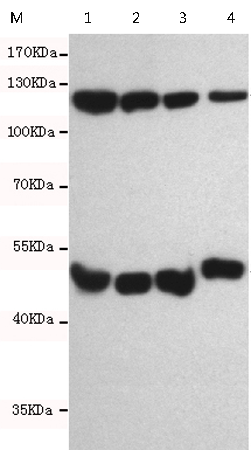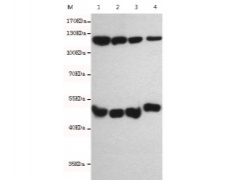中文名稱:小鼠抗NFKB1單克隆抗體
|
Background: |
This gene encodes a 105 kD protein which can undergo cotranslational processing by the 26S proteasome to produce a 50 kD protein. The 105 kD protein is a Rel protein-specific transcription inhibitor and the 50 kD protein is a DNA binding subunit of the NF-kappa-B (NFKB) protein complex. NFKB is a transcription regulator that is activated by various intra- and extra-cellular stimuli such as cytokines, oxidant-free radicals, ultraviolet irradiation, and bacterial or viral products. Activated NFKB translocates into the nucleus and stimulates the expression of genes involved in a wide variety of biological functions. Inappropriate activation of NFKB has been associated with a number of inflammatory diseases while persistent inhibition of NFKB leads to inappropriate immune cell development or delayed cell growth. Alternative splicing results in multiple transcript variants encoding different isoforms, at least one of which is proteolytically processed. |
|
Applications: |
WB |
|
Name of antibody: |
NFKB1 |
|
Immunogen: |
Fusion protein of human NFKB1 |
|
Full name: |
nuclear factor kappa B subunit 1 |
|
Synonyms: |
p50; KBF1; p105; EBP-1; CVID12; NF-kB1; NFKB-p50; NFkappaB; NF-kappaB; NFKB-p105; NF-kappa-B |
|
SwissProt: |
P19838 |
|
WB Predicted band size: |
105 kDa |
|
WB Positive control: |
K562, C6, 3T3 and Hela cell lysates |
|
WB Recommended dilution: |
500-2000 |


 購物車
購物車 幫助
幫助
 021-54845833/15800441009
021-54845833/15800441009
